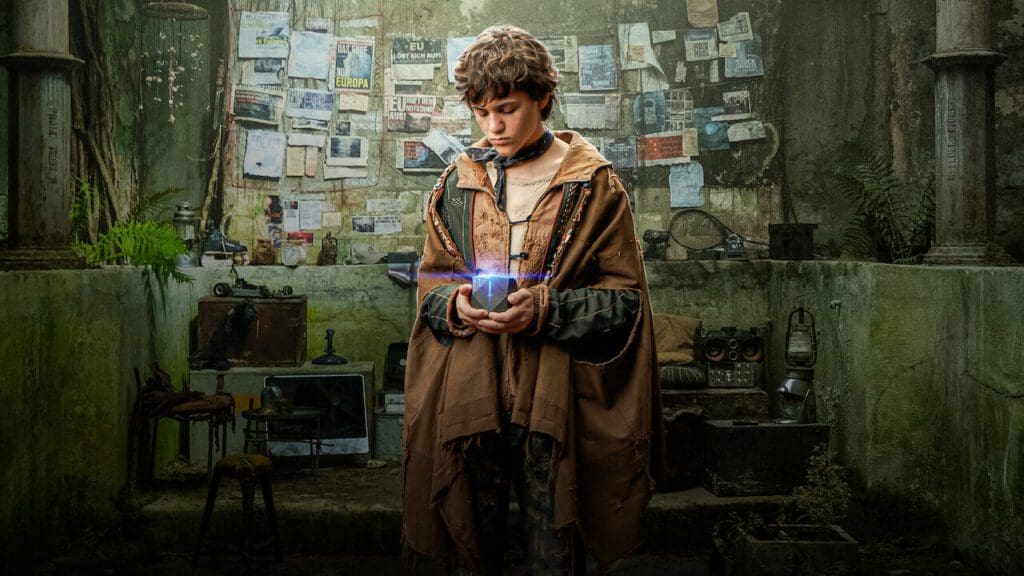Summary
Tribes of Europa has enough good ideas and elements to earn a second season, but thanks to thin worldbuilding and a paltry six episodes, it needs one to realize its potential.
This review of Tribes of Europa is spoiler-free.
With the way things are going currently, I wouldn’t be surprised if humanity’s downfall is closer than we think. With that in mind, it can be a bit of a burden to watch another post-apocalyptic series, especially one that blends so many elements from other ones; it’s less escapism and more a reminder of the dystopian future we’re all inevitably hurtling towards. The downside for us is that we won’t have the magically advanced technology of the fabled Atlantians to save us. I doubt it, anyway.
But I’m getting ahead of myself. Tribes of Europa is Netflix’s latest all-singing, all-dancing sci-fi series, built on a bedrock of so many successful tropes and ideas that it’s virtually guaranteed to be popular. I got a good helping of Apple TV+’s See from it, especially with the sexually adventurous villainess and the enthusiasm for evocatively-shot woodland. It’s a weaker show than that overall, though, thanks in large part to being too brisk for its own good. Eight or ten episodes of a Netflix series tend to be too many, but it turns out six isn’t enough – at least not for a show like this.
It’s an interesting world that’s teased, too, which I suppose doesn’t help. Set in a 2074 twinned with the Middle Ages, a global blackout known enigmatically as Black December has long-since reduced Europe to tribes of squabbling micro-states with their own beliefs, customs, cultures, and levels of technology. Naturally, they’re almost all fighting over control of what remains, and those that aren’t – namely the Luddite hunter-gatherer Origines, a faction to which our three sibling protagonists belong – have no choice but to be pulled into the fighting regardless, especially when an advanced aircraft belonging to the Atlantians crash-lands within spitting distance of our heroes. Since it contains a device of nebulous importance and power that may or may not hold the key to controlling Europa, the far-flung sanctuary of the Origenes finds itself on the travel itinerary of the Crows, a despotic caste of strung-out, black-clad marauders led by an androgynous Kapitan in platform heels and a lord, Varvara (Melika Foroutan), who is attended to by a coterie of male slaves in makeup and BDSM gear.
See what I mean? Flamboyant psychosexual villains, isolationist outdoorsmen heroes, ruined society, general mistrust of technology… there are a lot of similarities. Tribes of Europa also focuses on a clutch of three characters, though more interestingly they’re separated very early on and mostly busy themselves with distinct plot strands, all roads leading to a finale that realizes at the last minute it has run out of time to tie everything together. The obligatory Netflix cliffhanger continues to blight its original series’, but very few people will expect a conclusive ending here – there’s hardly enough time to set the story up properly, let alone conclude it.
The good news, though, is that the story it does manage to tell is pretty strong, and has plenty of long-term potential. In one strand, younger brother Elja (David Ali Rashed) makes off with the Atlantian cube and joins forces with a fast-talking scoundrel archetype in the hopes of delivering the artifact to its people, naturally with a few deviations through the seedier corners of Europa; in the second, Liv (Henriette Confurius) gets embroiled with the Crimsons, a military force who allow the tribes under their banner to retain their cultural identities and have a bone to pick with the Crows; and in the third, Kiano (Emilio Sakraya) finds himself shacked up with the Crows themselves and having to fight for his freedom in a gladiatorial arena.
This constant shifting of settings and perspectives helps with the pacing, ensuring that none of the storylines gets too dreary, and it helps us get to know each protagonist individually. It also means lots of seeds being planted – including some kind of devastation coming from the East that everyone should be concerned with – that won’t bear fruit until a second season; provided Tribes of Europa gets one, since you know how Netflix can be.
I have a strong suspicion people will like this, though. It has solid characters and ideas, interesting dynamics, and one assumes much more interesting mythology than six 40-ish-minute episodes could properly cater for. Such a brief runtime leaves certain elements feeling a bit neglected, though whether that’s a barrier for investment in this season or an ideal setup for the next one is going to depend on the viewer. I tend to think that the good more or less outweighs the bad in this case, and I’d be happy to see more of it. Whether or not we will is anyone’s guess.



